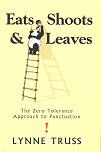This is the unexpected best-seller of 2003, and deservedly so. It is witty, laugh-out-loud funny, beautifully written, full of fascinating historical factlets and asides, and is also about punctuation: how to used commas, semicolons, dashes, hyphens, and most important of all, apostrophes. It should appeal not only to those anal about punctuation, those who froth at the sight of a "greengrocer's apostrophe" [for some reason, I was given this as a Christmas present], but also to anyone who wonders why some strange people froth at perfectly innocent signs like "carrot's and onion's", and anyone who wants to know how those funny little squiggles can help us present our thoughts more clearly.
Read this, and you will know the answers to "what's the difference between it's and its?", "should the punctuation go inside or outside the quotation marks?", and "should there be a comma before the last item in a list?" You will also discover how punctuation marks and rules have changed over the centuries. And you will have enormous fun on the journey of discovery, too.
Like the author, I was delighted to discover the existence of the Apostrophe Protection Society, and, like the author, I want to know if it has a militant wing. Wonderful.


